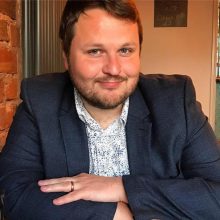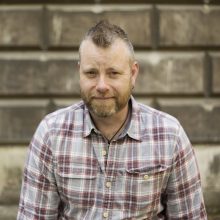The End of the Line by Gray Williams
What led you into writing?
I’ve been interested in writing since I was little and I remember filling a big green notebook with story ideas. My first real revelation toward being an author was when I was at school and one of the teachers introduced an hour of creative writing every week. I loved it! There were these Sonic the Hedgehog novels coming out at the time and I devoured (and then plagiarised) them like crazy. I lived for that hour, sitting and making up stories and I wrote so many adventures where me and my friends went off fighting monsters together, foiling villains and saving the world. I was always told I had a good imagination and here I was getting good marks for doing something I enjoyed. It wasn’t until I went to Bath Spa University (with Creative Writing as my minor) that I started to get serious. After a bad break-up, when suddenly I had a lot more time to myself, I resolved to start writing 500 words a day and by the end of the year, I found I’d written a whole novel. That was the real start for me, when I started writing every day.
How does a typical day look?
I always try to get my writing done in the mornings, that’s when I’m at my best. What I do with that time depends on the stage I’m at with a novel. At first draft, I’m trying to write 2,000 words. On good days that can take as little as an hour and a half, on the bad I’m struggling until dinner. When I’m editing, I stick to four or five hours a day, working through the pages and making the changes where they’re needed. Research is the same, four or five hours reading and researching. The afternoons are more for the admin side, I answer emails, write newsletters, update my website, talk to reviewers, etc. Or if there’s none of that to do then I play a video game, read a book, generally try to relax. Writing a novel is a marathon, so it’s good to go steady and not overstretch. I know I’m pushing myself too hard when I wake up dreading the keyboard so I try to avoid that as much as possible – keep the author happy!
In what ways do your characters test your abilities?
Making them human is always a test. You can write your characters, put words in their mouths and make them trundle along your plot, uncovering the clues you placed for them, but where’s the fun in that? We humans are unpredictable, we react to things in odd ways. We have thoughts and second thoughts, and thoughts about thoughts, and thoughts about other people’s thoughts. The brain is this constant buzz of internal reactions and outside stimulus. Trying to get that on the page is tricky, but if you can do it, even a little, it’s wonderful. It was a major challenge for The End of the Line. All of the characters are extremely distrustful, they all have their points of view and unique relationships with one another and they’re all stuck in a single cargo container, nowhere to run to and no privacy in which to team up and conspire against the others. Putting the characters in that situation, all of them trying to second guess everyone else, it was tough at times! Recreating that level of pressure-cooker paranoia led to me redrafting some scenes a hundred times before I felt I had it right. Damn if it wasn’t worth it though.
What’s your setup?
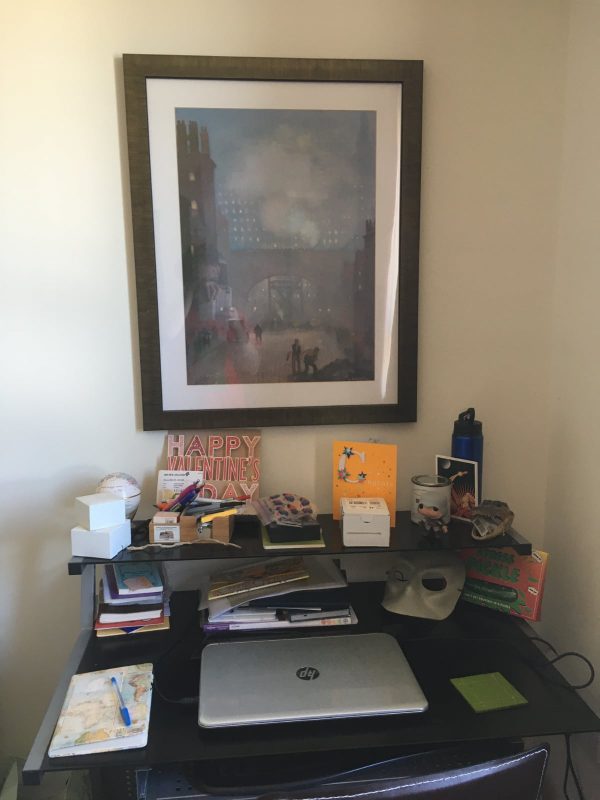
I live with my wife in a two bedroom flat and the second bedroom acts as my office (though it is very occasionally used as a guest bedroom). I have my desk by the window, I’m surrounded by notebooks and nick-nacks from my travels, gifts from friends and fellow authors, and my laptop. It’s not much but it’s all I need.
What lasting effects have your favourite authors had on your writing and style?
That’s a tough one! It’s like asking which was my favourite breath, or wave in the ocean. I’ve read so many amazing authors in my life, it’s difficult to see where their influence ends and I begin. In the end, I suppose, as I’ve read, I’ve gravitated to authors who write in a style I enjoy, who tell the kind of stories I want to hear. I’m a big fan of Mike Carey, Libba Bray, Joe Abercrombie, Steph Swainston, the list is endless really but, today, these are the authors who come to mind. They all did something different with their stories that I hadn’t felt like I’d seen before and my mind always goes back to something in their works. Steph Swainston has written the series about what it’s like to be immortal, I think. I always think about the exchange between two differently aged immortals where one said (I’m not direct quoting here) ‘I remember when this town was all fields’ and the older one replied ‘Fields? I remember when those fields were hills!’ I feel she nailed the experience in immortality in that exchange, these two characters for whom time merely passes around them, not necessarily making them wiser or better just ‘older’.
I’ve picked up a few narrative tricks from my favourite authors and delighted where they’ve surprised or shocked me, or just written a really amazing book. But every author is alone when they’re in front of the keyboard and I like to think that my writing ‘voice’ is my own. My voice is how I write, the stories I tell are my stories, and just like I can’t reproduce the works of my favourite authors, they can’t reproduce mine either. But I’m grateful to all of them because in some immeasurable way, they’ve influenced the path I’ve taken and they will always continue to do so.
What do you do for inspiration?
I love stories in whatever form they’re in. I play video games, I watch a lot of TV and films, I read books and comics, I go to the theatre, I play roleplaying games and board games with friends, listen to radio plays. I’m always consuming narrative in some way or another. My wife will tell you, when I’m coming out of a play I absolutely loved (The White Guard was one that really stood out) my brain is absolutely tumbling over and over, dwelling in the world the play laid out before us. Those are the kind of things that help me with ideas and characters. For world-building I head to non-fiction, I watch documentaries and read books. My imagination is good, but to actually see what actual people did in real-life situations goes far beyond anything I could create. Humans are endlessly inventive and it’s always fascinating to see what they’ve built or how they’ve adapted to a situation.
What repeating themes do you find yourself pulling into your stories?
That’s an interesting one! I’m not sure if I’ve written enough books to be able to tell yet. I think compromise is a big thing in my books. And I don’t mean two people agreeing to meet in the middle, I’m talking about inner-compromise. How much is a character willing to sacrifice to get what they want? How much of their beliefs are they willing to negate? What really matters to them? How far will they go and who will they betray to achieve their goals? The Black Market Magic books also explore power, who has it and who doesn’t. In a world where magic is real, I think people would expect powerful magic users to be at the top of the food chain. It’s certainly been written that way before. But that’s not how things work. Being a top scientist or inventor doesn’t lead to having power. There are few inventors who get wealthy from the products they invent, but that’s the exception, many simply did it for a salary and it’s the heads of the corporations who reap the benefits of their labour. In my books, magic is just another resource to be exploited by the already rich and powerful. They don’t need spells, they hire the people who have them.
How do you wind down?
The ways I wind down are the same ways I get inspiration! I like to watch television, my wife and I are currently deep into Perry Mason, The Plot Against America, The Great and a few other things. Thanks to lockdown, I’m playing vast amounts of Fallout 4 and enjoying rebuilding civilisation one farmstead at a time. Once a week, we meet up with friends on Houseparty and play an RPG called Blades in the Dark, where we’re a sinister cult trying to convert a broken city to our new faith via a series of heists, kidnappings and general madcap shenanigans.
What sort of challenges do you regularly overcome while world-building?
Adding magic to the real world is very tricky. Humans are very complicated and clever creatures and collectively we adapt and change to one another and come up with things that no one person could conceive alone. A good example of a world building challenge for me was coming up with Coldwater Prison in Strange Ways, a high-security island prison for magic users. I had to ask myself what such a prison look like and how it would operate. How would it differ from a regular prison? How would it be the same?
It would still need all the regular staples of a prison, I decided, the basics of being a human aren’t any different. A prison requires cells, food, water, warmth, sanitation, all of which already exist and so that side only required a bit of research into how prisons work (or don’t). Then I had to take into account that each of these prisoners can perform magic. With a few motions of their hands or some carefully drawn sigils (which can be made from any material so long as the shapes keep their integrity for long enough) and the physical rules that constrain them all could be broken. So it became a mental game of cat and mouse where I created rules, then tried to break them, then set up new rules to stop them being broken and so on. In the end, anything that could be used to draw or paint a sigil had to be highly controlled. That would mean toothpaste, makeup, spaghetti sauce, anything that could be sourced in big enough quantities would have to be monitored. And of course humans can make their own, ahem, materials. So that meant having to come up with another preventative measure, so I made the walls uneven! You can’t draw a nice precise sigil if the walls and floors are covered in uneven bumps and obstacles. That’s what I have to face when worldbuilding, it’s a never ending feedback loop of ‘then’ and ‘therefore’, and all the time I’m working, I know full well that world is full of people smarter than me in a lot of different fields of study. An engineer or architect, I’m sure would have a dozen other ideas of how to build a wizard prison, but persuading them to take the time to layout a schematic for me was surprisingly difficult…
What are you reading at the moment?
I’m currently reading Before the Deluge by Otto Friedrich for research, a book charting the history of Berlin from rise of the Weimar Republic after World War One to its falling to the Nazis. It was such an interesting city and era with its politics, warring factions, increased sexual and gender freedoms, the growth of cinema, organised crime, terrible poverty and heady decadence. When I’m not researching I’m reading Dragonfly Falling by Adrian Tchaikovsky and really enjoying it, the war, the espionage, Adrian’s set-up such an interesting world and I’m looking forward to exploring more of that series. I loved his book Children of Time.
What’s the most useful advice you could give to an aspiring author?
Keep writing is the ‘go to’ piece of advice, because in the end that’s the biggest, simplest thing you can do. Everything else you can figure out while you’re doing that one.
But another thing I will say is that ‘it never ends’. If you write a book and it doesn’t get you an agent? Then write another book. That isn’t you done. Wrote a book and it got you an agent? Amazing! But they didn’t manage to sell it to a publisher? That’s a shame. Write another book. Get a book published and it doesn’t sell well? Maybe the next one will be better! Write another book. There’s always more writing to be done and like everything else it doesn’t end in a Happily Ever After. If you’re getting into the life of a writer, it’s a commitment. Possibly for life. You get less for murder.
Tell us about the book you’re promoting.
I have two books I’m promoting at the moment, the first and second in the Black Market Magic series, The End of the Line and Strange Ways. Both are set in a world much like ours except for one crucial difference: magic is real and outlawed in the UK. The End of the Line follows a group of criminals dealing with the aftermath of their gang boss’s terrible decision to summon a demon in order to help them with their work. Now, their gang in bloody tatters, they have the demon in chains and on a train to a remote Siberian stone circle, the only place the demon can be killed. But as their protections wear down and the demon begins to regain its powers, they have to resist its influence long enough to vanquish it. Strange Ways follows on from The End of the Line, where the survivors from the first book reunite for another job. A mysterious blackmailer wants an inmate of Coldwater Prison, an island penitentiary for magic users, assassinated. So not only must they find a way onto the island but find a way off as well. They’re both fast-paced thrillers, filled with magic, intrigue and action. I hope you like them!
👋 Hi! I run Author Interviews
As a new writer I found myself itching to contribute to a thriving, creative community, so I made Author Interviews and I've met loads of wonderful people in the process. You can buy my debut fantasy RINGLANDER: THE PATH AND THE WAY from Amazon.
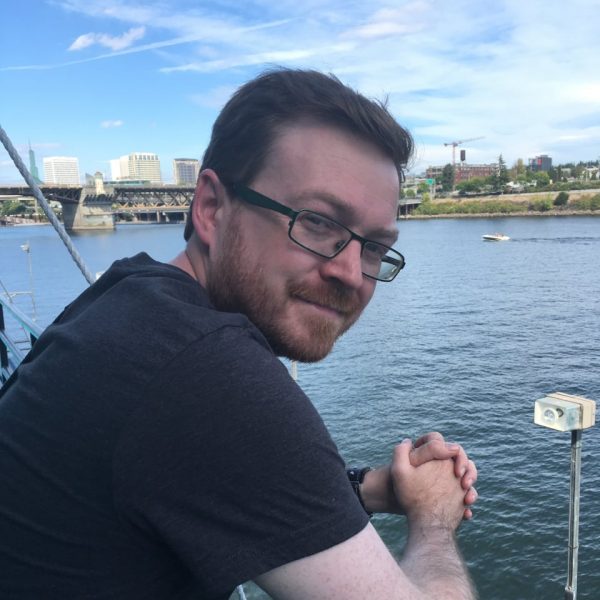
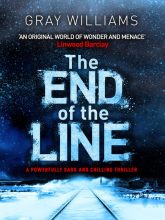
 Audible
Audible
